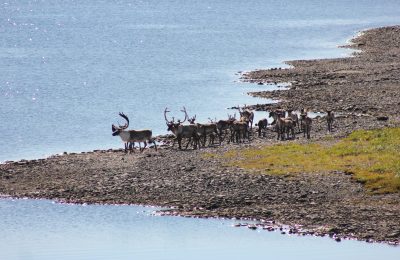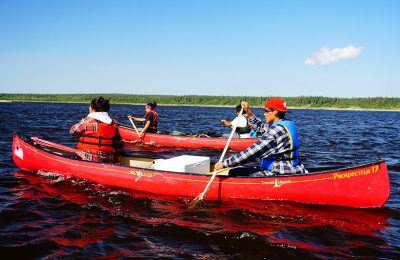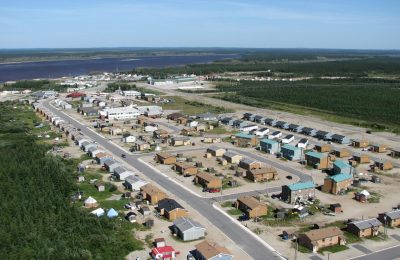The Regional Forum on Climate Change was organized by the Cree Nation Government to provide a platform for people to express their concerns about climate change, and design appropriate responses to cope with its impacts. Over 100 people gathered in Eastmain, on November 6-7, 2018, for this purpose. Residents from the 10 Cree communities of Quebec participated in the Forum, along with representatives from the Cree Nation Government, the Cree Trappers’ Association, the Cree Board of Health and Social Services of James Bay, the Ministry of Crown-Indigenous Relations and Northern Affairs Canada, Environment and Climate Change Canada, Health Canada, researchers and representatives from McGill University, Université du Québec en AbitibiTémiscamingue, Ouranos, the James Bay Advisory Committee on the Environment and other stakeholders from various entities. Many participants provided presentations about their work on climate change in Eeyou Istchee, the measures that are already in place, along with the opportunities that exist to fund and develop new initiatives related to climate change adaptation.
Regional Climate Change Report
Priorities in the context of climate change
Quick Links
Select on a section of the page to view
Navigation
Priority 1: Biodiversity, Harvesting and the Land
Climate change leads to major changes in the distribution and abundance of animal and plant species in Eeyou Istchee, along with transformations in the conditions of access to land. The rapidly changing environmental conditions raise new issues for the pursuit of traditional activities and the transmission of traditional knowledge. Many participants have highlighted that unpredictable weather is already disturbing hunting activities. Three main responses have emerged from the discussions, and concrete propositions have been laid out for each of these responses.
Priority 2: Cree Culture, Education and Research
Due to the rapid changes that have occurred over the past decades in Cree society, the transmission of Cree tradition and knowledge about the land remains a major preoccupation. This preoccupation is heightened in the context of climate change, which affects the very relation between people and their environment. Amidst fast social and economic transformations, youth do not enjoy the same level of access to the land and do not engage in harvesting activities in the same way as previous generations. Thus, creating gaps in intergenerational relations. Education and research can play a significant role in the recording and transmission of Cree culture, if adequate actions are taken to make sure that educational activities and means of producing knowledge become vectors of cultural transmission for the Cree nation. At stake is more than knowledge and skills, but also the Cree identity.
Priority 3: Health, Quality of Life, Housing and Technologies
Despite the recognition of Cree rights, and the James Bay and Northern Quebec Agreement, Cree communities are still facing many issues that could adversely affect their development. Many Cree people believe that their quality of life remains vulnerable to climate change and have reflected on ways to improve the situation. Climate change provides a new incentive to implement adequate responses to current issues, and to increase communities’ resilience to environmental hazards. They have designed specific responses related to the three following themes: ensuring water and food quality, improving housing quality and implementing green technologies.
Climate Adaptation Plan: Mistissini
Background
The Environment and Remedial Works Department worked with community members of the Cree Nation of Mistissini to create a video and develop a Community Proposal on a Climate Change Adaptation Action Plan. This plan is the result of a community-based participatory project that took place in February and March 2018 in Mistissini. The goal of this project was to bring together community members of Mistissini to identify appropriate solutions to cope with the impacts of climate change and to increase community resilience.
Climate Adaptation Plan: Waskaganish
Background
This project adapted a participatory approach, that included the training of a local research and video team, interviews with community members, two stakeholder meetings and a community screening event. The findings and recommendations that resulted from this process are also presented in a written version of our climate change adaptation plan. Our hope is that these outputs may guide our community members as well as other Cree communities to start planning and implementing responses that will help to lower the risks associated with present and future climate change. This project was project managed by the Cree Nation Government and the Cree Nation of Waskaganish. It was delivered by InsightShare with the financial support of Indigenous and Northern Affairs Canada.
Climate Adaptation Plan: Whapmagoostui
Background
We are the Cree of Whapmagoostui. Our community is located at the mouth of the Great Whale river on the coast of the Hudson Bay in Northern Quebec, Canada.
In 2019 we came together to discuss how climate change is affecting our community, to identify appropriate solutions to cope with the impacts and to increase our resilience.
This project adapted a participatory approach, that included the training of a local research and video team, a series of stakeholder meetings, interviews with community members and a community screening event.
The findings and recommendations that resulted from this process are also presented in a written version of our climate change adaptation plan:





